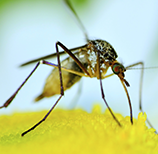
In recent years awareness of heartworm disease has increased a great deal. Heartworm infections are virtually preventable and yet hundreds of thousands of dogs are infected every year. Preventives are safe and affordable and most of all effective. So why are we still seeing heartworm disease? There are a lot of misperceptions out there about the factors that increase the risk of heartworm infection in your pet. Let’s talk about 10 things you need to know about heartworm and your dog. Learn more about feline heartworm disease here.
1) Geographic distribution: Many people believe that heartworm infections occur only in warm humid regions like the south. Though heartworms first entered our country along the Gulf of Mexico and were once primarily found in the South, infected dogs have now been reported in all 50 states. Why? Our society is extremely mobile and when people move they take their dogs with them. Some of those dogs have heartworms.
2) Test annually: All dogs are susceptible to infection and should be tested prior to starting preventives. Additionally, all dogs -- even those on monthly prevention -- should be tested yearly for heartworms and internal parasites as part of a complete preventive health care program.
3) Heartworm reservoirs: Coyotes have been recognized as a major reservoir host for heartworms and wherever coyotes live there are likely heartworms. Additionally, un-owned stray dogs can be infected and serve as a reservoir as well.
4) Transmission of heartworms: Mosquitoes are the vector or method of transmission for heartworms. Many people are not aware of the local and regional infestations of mosquitoes that they and their dogs are exposed to. Mosquitoes transmit a vast number of diseases and mosquito control is an important step in preventing diseases. A single bite from an infected mosquito can infect your dog with heartworm.
There are many species of mosquitoes capable of transmitting heartworms and as we have learned more about mosquitoes we know that mosquitoes are not strictly a summer pest. Mosquitoes can readily overwinter in microclimates like a garage, greenhouse or other places where a warm environment can be maintained. We know that though the risk may be greater in the summer, mosquitoes are really a year round insect that can increase in numbers quickly.
5) Influences of climate: Environmental changes have made once believed triggers like the first or last frost less relevant in the war against heartworms. It is best to consider mosquitoes a year round reality and with the report of heartworm cases in all 50 states, the risk of infection is almost universal in the US and preventive steps should be taken in every dog all year round.
6) Indoor sources: Heartworm disease is not restricted to outdoor dogs. It is common to find mosquitoes indoors even in winter. While the risk of exposure is greater in outdoor animals, indoor dogs and cats are also at risk.
7) Size: While larval stages are microscopic in size, adult heartworms can grow to over a foot in length. Imagine for a moment a worm of that size living in an artery of the lung. Now imagine dozens of these worms living in the heart and lung of a dog. Infection is devastating to the dog’s circulation and debilitation and death are common.
8) Treatment: While treatment is relatively well understood, heartworm infection is difficult to cure. The treatment involves injectable arsenic-like chemicals and requires weeks and even months of total exercise restriction. Part of the treatment also involves antibiotics in the form of Doxycycline and ironically the use of preventives to control further infections.
Some have advocated for a “slow kill” which reduces the speed at which worms die and hence the risk of complications. This method is no longer suggested since it may contribute to the development of resistance to existing preventives.
9) Prevention: Current preventives are all members of a group of drugs called macrocyclic lactones. All are similar in action in that they prevent the maturation of immature heartworms. All are effective and are used in various combinations to prevent and control other parasites. Oral, injectable or topical forms are administered regularly, and should be used year round. Your veterinarian is the best source for a recommended product. Always consult with your veterinarian before choosing a product. Learn more about prevention.
10) Additional preventive measures: An important part of mosquito control is eliminating places where they reproduce: prevent standing water in dishes, flower pots, ponds and puddles. Mosquitoes breed and reproduce very efficiently.
Window screens are an obvious control but make sure they fit windows snugly and are free of openings.
Avoiding outdoor exposure at twilight. Mosquitoes feed actively at this time and keeping dogs indoors can do a lot to prevent exposure.
Heartworms are a serious health problem for dogs and cats. Prevention is an essential part of responsible pet ownership.
See your veterinarian at least yearly and always focus on preventive care.
If you have any questions or concerns, you should always visit or call your veterinarian -- they are your best resource to ensure the health and well-being of your pets.

